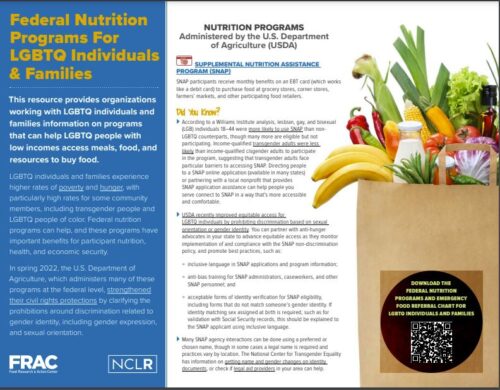June 20, 2024
LGBTQIA+ individuals and families experience higher rates of poverty and hunger, with particularly high rates for some community members, including transgender individuals and LGBTQIA+ people of color.
Anti-hunger advocates can be vital players in addressing disproportionately high rates of food insecurity and economic insecurity among LGBTQIA+ individuals and families by strengthening access to federal nutrition programs.
Advocacy organizations can connect LGBTQIA+ individuals and families with low incomes to federal nutrition programs such as the Supplemental Nutrition Assistance Program (SNAP), Special Supplemental Nutrition Program for Women, Infants, and Children (WIC), school and out-of-school-time programs, and home-delivered and congregate meals programs. These programs are proven to address hunger and improve nutrition, health, and well-being, as well as spur economic activity.
Resources for LGTBTQIA+ Communities

This Pride Month, use these resources from the Food Research & Action Center (FRAC) and the National Center for Lesbian Rights (NCLR) that provide information on federal nutrition programs that can help LGBTQIA+ individuals and their families access meals, food, and benefits to buy food:
- FRAC-NCLR fact sheet with key recommendations on accessing nutrition programs for LGBTQIA+ households. The resource highlights how providers may be able to leverage programs, such as the summer meals programs, to serve healthy meals to LGBTQIA+ youth they serve.
- Federal Nutrition Programs and Emergency Food Referral Chart that overviews the range of programs available by age group to help providers quickly assess what programs are available to the people they serve. It includes basics on programs operations, eligibility, and where to learn more and apply. It also includes an opportunity for organizations to add customized information on local resources available in their community.

